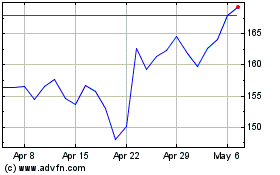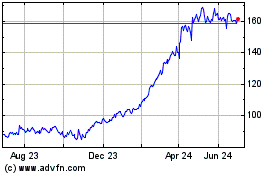By Thomas Gryta
General Electric Co.'s board was once so cozy that it had to set
a 15-year term limit to ensure directors didn't stick around too
long.
When investors gather Wednesday after two tumultuous years, they
will elect an overhauled board with an average tenure of just 2.5
years. It is led by a pair of outsiders who joined just a year ago:
Chairman and Chief Executive Larry Culp and the lead independent
director, Thomas Horton.
GE lost $200 billion in market value over 2017 and 2018 as the
company faced problems in its power and financial-services
divisions that were compounded by unrealistic performance goals and
spending decisions that led to two dividend cuts. The problems
raised questions about the board's oversight when Jeff Immelt was
chairman and CEO.
Mr. Immelt left in 2017, and several of GE's longest-serving
directors said they would do the same. In October, the company put
Mr. Culp in charge just months after he joined the board.
"Larry understands the challenges GE faces," Mr. Horton wrote in
a letter to investors. "He also knows that despite his excellent
track record, he needs to prove himself everyday."
Mr. Culp, who previously led the smaller conglomerate Danaher
Corp., is expected to field questions from investors at Wednesday's
shareholder meeting at a hotel in Tarrytown, N.Y. In previous
years, the event was used to showcase one of GE's high-tech
facilities.
Many retirees typically attend the annual gathering to voice
frustration with changes to their benefits. Last year, at a GE
factory near Pittsburgh, union protesters gathered outside, and
this year may be similar. In recent weeks, union members have
rallied at GE's Schenectady, N.Y., facility ahead of contract
negotiations in June.
GE retiree Dennis Rocheleau submitted a proposal seeking to claw
back compensation from former top executives, who he says set
unrealistic financial forecasts and misspent billions of dollars on
stock buybacks.
"Immelt needs to be held accountable," Mr. Rocheleau said before
the meeting. GE requested that the proposal be excluded from the
proxy, which the Securities and Exchange Commission granted, saying
that the proposal was an attempt to micromanage the board's
decisions.
Aside from the board election, the company is asking
shareholders to approve executive compensation and its decision to
keep KPMG as auditor. Shareholder proposals include a call for
separating the roles of chairman and CEO.
GE's board explored naming an independent chairman when it
switched CEOs but opted to give both roles to Mr. Culp, saying it
would provide clarity on decision-making and accountability.
The major proxy advisory firms, ISS and Glass Lewis, disagree.
They recommend having an independent chairman to improve
governance, and both oppose GE's executive compensation plans. Mr.
Culp received a special stock award to join GE that the company
valued at $13.7 million. ISS valued it at $37.8 million.
Last month, the board's compensation committee wrote a letter
encouraging shareholders to endorse the pay plans, saying they
should be considered in the context of hiring attractive
candidates.
GE, whose accounting is being investigated by federal
authorities, has promised to explore replacing KPMG as its auditor,
a role it has held for more than a century. In April 2018, 35% of
GE shareholders voted against KPMG remaining as GE's auditor, an
unusually high amount of opposition.
ISS supports KPMG continuing as auditor, citing GE's planned
process to find a replacement. Glass Lewis, however, is
recommending against approval because it believes shareholders
should send a message that change is needed.
Mr. Culp is continuing the work of his predecessor, John
Flannery, a GE lifer who sought to reshape the board after 16 years
of Mr. Immelt at the helm. The board has met 15 times in each of
the past two years, according to the proxy filings, but will reduce
the number of regularly scheduled meetings in 2019 to six from
eight to "permit senior leadership to focus on management." The
board will still hold regular conference calls every few weeks.
The board is down to 10 members from 18, but two more directors
will eventually join. Six of the 10 are new since Mr. Immelt
retired, and eight joined after 2016, including Ed Garden,
co-founder of the activist investor Trian Fund Management LP.
Last year brought the most change, with eight members retiring
and the addition of Messrs. Culp and Horton. Mr. Culp was briefly
lead director before being named CEO, and that duty now falls on
Mr. Horton, who steered American Airlines through bankruptcy and a
merger with US Airways.
The two men have largely stuck to the strategic plans laid out
last June to simplify the company and pay down debt. GE has closed
the sale of its transportation business, is selling its stake in
oil services firm Baker Hughes and recently reached a deal to sell
its biotech business to Danaher for about $21 billion.
GE's shares have rallied almost 40% so far this year but are
still down 25% from a year ago. Mr. Culp has said recently it will
take several years to restructure the company.
Write to Thomas Gryta at thomas.gryta@wsj.com
(END) Dow Jones Newswires
May 08, 2019 05:44 ET (09:44 GMT)
Copyright (c) 2019 Dow Jones & Company, Inc.
GE Aerospace (NYSE:GE)
Historical Stock Chart
From Mar 2024 to Apr 2024

GE Aerospace (NYSE:GE)
Historical Stock Chart
From Apr 2023 to Apr 2024
